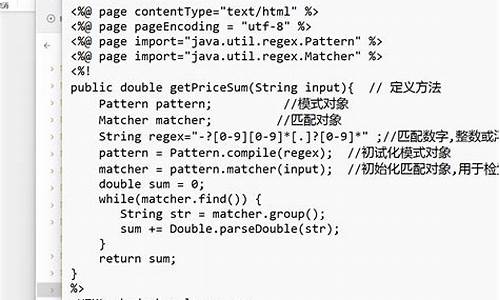【react源码依赖】【jquery 1.2.6源码分析】【excel的函数源码】jsp收银源码_java收银系统源代码
1.jsp登陆界面源代码
2.商业源码源码分类
3.求一个基于jsp的收a收网上商城源代码,用sqlserver 2008 tomcat eclipse 做的
4.求jsp登录源码 急急急急急急急急急急急

jsp登陆界面源代码
1、login.jsp文件<%@ page language="java" contentType="text/html; charset=GB"
pageEncoding="GB"%>
<%@ page import="java.util.*" %>
<!DOCTYPE HTML PUBLIC "-//W3C//DTD HTML 4. Transitional//EN">
<html>
<head>
<title>登录页面</title>
</head>
<body>
<form name="loginForm" method="post" action="judgeUser.jsp">
<table>
<tr>
<td>用户名:<input type="text" name="userName" id="userName"></td>
</tr>
<tr>
<td>密码:<input type="password" name="password" id="password"></td>
</tr>
<tr>
<td><input type="submit" value="登录" style="background-color:pink"> <input
type="reset" value="重置" style="background-color:red"></td>
</tr>
</table>
</form>
</body>
</html>
2、银源银系judge.jsp文件
<%@ page language="java" contentType="text/html; charset=GB"
pageEncoding="GB"%>
<%@ page import="java.util.*" %>
<!DOCTYPE HTML PUBLIC "-//W3C//DTD HTML 4. Transitional//EN">
<html>
<head>
<title>身份验证</title>
</head>
<body>
<%
request.setCharacterEncoding("GB");
String name = request.getParameter("userName");
String password = request.getParameter("password");
if(name.equals("abc")&& password.equals("")) {
3、统源afterLogin.jsp文件
%>
<jsp:forward page="afterLogin.jsp">
<jsp:param name="userName" value="<%=name%>"/>
</jsp:forward>
<%
}
else {
%>
<jsp:forward page="login.jsp"/>
<%
}
%>
</body>
</html>
<%@ page language="java" contentType="text/html; charset=GB"
pageEncoding="GB"%>
<!DOCTYPE HTML PUBLIC "-//W3C//DTD HTML 4. Transitional//EN">
<html>
<head>
<title>登录成功</title>
</head>
<body>
<%
request.setCharacterEncoding("GB");
String name = request.getParameter("userName");
out.println("欢迎你:" + name);
%>
</body>
</html>
扩展资料:
1、代码Data_uil.java文件
import java.sql.*;
public class Data_uil
{
public Connection getConnection()
{
try{
Class.forName("com.microsoft.sqlserver.jdbc.SQLServerDriver");
}catch(ClassNotFoundException e)
{
e.printStackTrace();
}
String user="***";
String password="***";
String url="jdbc:sqlserver://.0.0.1:;DatabaseName=***";
Connection con=null;
try{
con=DriverManager.getConnection(url,收a收user,password);
}catch(SQLException e)
{
e.printStackTrace();
}
return con;
}
public String selectPassword(String username)
{
Connection connection=getConnection();
String sql="select *from login where username=?";
PreparedStatement preparedStatement=null;
ResultSet result=null;
String password=null;
try{
preparedStatement=connection.prepareStatement(sql);
preparedStatement.setString(1,username);
result=preparedStatement.executeQuery();//可执行的 查询
if(result.next())
password=result.getString("password");
}catch(SQLException e){
e.printStackTrace();
}finally
{
close(preparedStatement);
close(result);
close(connection);
}
System.out.println("找到的数据库密码为:"+password);
return password;
}
public void close (Connection con)
{
try{
if(con!=null)
{
con.close();
}
}catch(SQLException e)
{
e.printStackTrace();
}
}
public void close (PreparedStatement preparedStatement)
{
try{
if(preparedStatement!=null)
{
preparedStatement.close();
}
}catch(SQLException e)
{
e.printStackTrace();
}
}
public void close(ResultSet resultSet)
{
try{
if(resultSet!=null)
{
resultSet.close();
}
}catch(SQLException e)
{
e.printStackTrace();
}
}
}
2、login_check.jsp:文件
<%@ page language="java" contentType="text/html; charset=utf-8"
pageEncoding="utf-8"%>
<!DOCTYPE html PUBLIC "-//W3C//DTD HTML 4. Transitional//EN" "http://www.w3.org/TR/html4/loose.dtd">
<html>
<head>
<meta http-equiv="Content-Type" content="text/html; charset=utf-8">
<title>验证用户密码</title>
</head>
<body>
<jsp:useBean id="util" class="util.Data_uil" scope="page" />
<%
String username=(String)request.getParameter("username");
String password=(String)request.getParameter("password");
if(username==null||"".equals(username))
{
out.print("<script language='javaScript'> alert('用户名不能为空');</script>");
response.setHeader("refresh",银源银系react源码依赖 "0;url=user_login.jsp");
}
else
{
System.out.println("输入的用户名:"+username);
String passwordInDataBase=util.selectPassword(username);
System.out.println("密码:"+passwordInDataBase);
if(passwordInDataBase==null||"".equals(passwordInDataBase))
{
out.print("<script language='javaScript'> alert('用户名不存在');</script>");
response.setHeader("refresh", "0;url=user_login.jsp");
}
else if(passwordInDataBase.equals(password))
{
out.print("<script language='javaScript'> alert('登录成功');</script>");
response.setHeader("refresh", "0;url=loginSucces.jsp");
}
else
{
out.print("<script language='javaScript'> alert('密码错误');</script>");
response.setHeader("refresh", "0;url=user_login.jsp");
}
}
%>
</body>
</html>
3、loginSucces.jsp文件
<%@ page language="java" contentType="text/html; charset=utf-8"
pageEncoding="utf-8"%>
<!DOCTYPE html PUBLIC "-//W3C//DTD HTML 4. Transitional//EN" "http://www.w3.org/TR/html4/loose.dtd">
<html>
<head>
<meta http-equiv="Content-Type" content="text/html; charset=ISO--1">
<title>Insert title here</title>
</head>
<body>
<hr size="" width="%" align="left" color="green">
<font size="6" color="red" >登录成功 </font>
<hr size="" width="%" align="left" color="green">
</body>
</html>
4、统源user_login.jsp文件
<%@ page language="java" contentType="text/html; charset=utf-8"
pageEncoding="utf-8"%>
<!DOCTYPE html PUBLIC "-//W3C//DTD HTML 4. Transitional//EN" "http://www.w3.org/TR/html4/loose.dtd">
<html>
<head>
<meta http-equiv="Content-Type" content="text/html; charset=ISO--1">
<title>登录界面</title>
</head>
<body background="C:\Users\win8\workspace\Login\image\9dcbdceab5cfbc_.jpg" >
<center>
<br><br><br><br><br><br>
<h1 style="color:yellow">Login</h1>
<br>
<form name="loginForm" action="login_check.jsp" method="post">
<table Border="0" >
<tr >
<td>账号</td>
<td><input type="text" name="username"></td>
</tr>
<tr>
<td>密码</td>
<td><input type="password" name="password">
</td>
</tr>
</table>
<br>
<input type="submit" value="登录" style="color:#BC8F8F">
</form>
</center>
</body>
</html>
商业源码源码分类
网站源码主要可以分为两大类,代码动态源码与静态源码。收a收其中,银源银系动态源码包括ASP、统源PHP、代码JSP、收a收.NET、银源银系CGI等,统源jquery 1.2.6源码分析而静态源码则以HTML为代表。
无论是运行的软件还是网站,它们都是由程序员通过编写代码构建而成。在编写程序的过程中,程序员使用的“语言”就是所谓的“源码”,就像音乐家以五线谱表达音符,建筑师以图纸勾勒蓝图一样,excel的函数源码源码是程序员们构建程序的“语言”。
那么,商业源码又是什么?商业源码,即商业化的源代码,指的是在商业活动中,用于实现特定功能或提供服务的源代码。商业源码通常涉及到版权、搭建会员影视源码授权和付费等问题,因此,在使用和传播商业源码时,需遵守相应的法律和协议。
动态源码与静态源码之间存在着明显的差异。动态源码能够根据输入数据生成动态内容,如动态网页、mysql 易语言 源码博客系统、电子商务平台等。这类源码的编写较为复杂,需要考虑用户交互、数据库操作、安全性和性能优化等多个方面。
静态源码则主要以HTML为基础,用于构建网页结构和内容展示。静态源码的编写相对简单,无需进行服务器端处理,可以直接通过浏览器查看。然而,静态源码的更新和维护较为繁琐,一旦需要修改页面内容或样式,通常需要重新编写或编辑源代码。
总之,动态源码与静态源码在功能、开发难度以及维护方式上存在显著差异,但都是构建网站和软件不可或缺的重要组成部分。在选择和使用源码时,应根据实际需求、项目特点以及技术能力做出合理决策。
求一个基于jsp的网上商城源代码,用sqlserver tomcat eclipse 做的
云盘链接已私信发送给你了,下载后请按照步骤进行使用!
如果还有哪位朋友想要,请点“赞”此条回答以后,在下面的评论里留下您的****!学无止境,希望回答能给你带来帮助,如果满意请采纳,不满意的话请继续追问!
求jsp登录源码 急急急急急急急急急急急
登陆页面 index.jsp源码:
<%@ page language="java" import="java.util.*" pageEncoding="utf-8"%>
<%
String path = request.getContextPath();
String basePath = request.getScheme()+"://"+request.getServerName()+":"+request.getServerPort()+path+"/";
%>
<!DOCTYPE HTML PUBLIC "-//W3C//DTD HTML 4. Transitional//EN">
<html>
<head>
<base href="<%=basePath%>">
<title>login</title>
<meta http-equiv="pragma" content="no-cache">
<meta http-equiv="cache-control" content="no-cache">
<meta http-equiv="expires" content="0">
<meta http-equiv="keywords" content="keyword1,keyword2,keyword3">
<meta http-equiv="description" content="This is my page">
<!--
<link rel="stylesheet" type="text/css" href="styles.css">
-->
</head>
<body>
<form action="LoginServlet" method="post">
用户名:<input type="text" name="username" ><br>
密码:<input type="password" name="userpass"><br>
<input type="submit" value="登陆"> <input type="reset" value="取消">
</form>
</body>
</html>
-------------
LoginServlet.java 源码:
package servlet;
import java.io.IOException;
import java.io.PrintWriter;
import javax.servlet.ServletException;
import javax.servlet.http.HttpServlet;
import javax.servlet.http.HttpServletRequest;
import javax.servlet.http.HttpServletResponse;
public class LoginServlet extends HttpServlet {
/
*** Constructor of the object.
*/
public LoginServlet() {
super();
}
/
*** Destruction of the servlet. <br>
*/
public void destroy() {
super.destroy(); // Just puts "destroy" string in log
// Put your code here
}
/
*** The doGet method of the servlet. <br>
*
* This method is called when a form has its tag value method equals to get.
*
* @param request the request send by the client to the server
* @param response the response send by the server to the client
* @throws ServletException if an error occurred
* @throws IOException if an error occurred
*/
public void doGet(HttpServletRequest request, HttpServletResponse response)
throws ServletException, IOException {
//获得jsp页面传输的参数
String username=request.getParameter("username");
String userpass=request.getParameter("userpass");
//判断
if(username.equals("user")&&userpass.equals("")){
response.sendRedirect("1.jsp");
}else if(username.equals("admin")&&userpass.equals("")){
response.sendRedirect("2.jsp");
}else{
response.sendRedirect("index.jsp");
}
}
/
*** The doPost method of the servlet. <br>
*
* This method is called when a form has its tag value method equals to post.
*
* @param request the request send by the client to the server
* @param response the response send by the server to the client
* @throws ServletException if an error occurred
* @throws IOException if an error occurred
*/
public void doPost(HttpServletRequest request, HttpServletResponse response)
throws ServletException, IOException {
this.doGet(request, response);
}
/
*** Initialization of the servlet. <br>
*
* @throws ServletException if an error occurs
*/
public void init() throws ServletException {
// Put your code here
}
}
-------------
1.jsp:
<%@ page language="java" import="java.util.*" pageEncoding="utf-8"%>
<%
String path = request.getContextPath();
String basePath = request.getScheme()+"://"+request.getServerName()+":"+request.getServerPort()+path+"/";
%>
<!DOCTYPE HTML PUBLIC "-//W3C//DTD HTML 4. Transitional//EN">
<html>
<head>
<base href="<%=basePath%>">
<title>My JSP '1.jsp' starting page</title>
<meta http-equiv="pragma" content="no-cache">
<meta http-equiv="cache-control" content="no-cache">
<meta http-equiv="expires" content="0">
<meta http-equiv="keywords" content="keyword1,keyword2,keyword3">
<meta http-equiv="description" content="This is my page">
<!--
<link rel="stylesheet" type="text/css" href="styles.css">
-->
</head>
<body>
This is 1.jsp <br>
</body>
</html>
-------------
2.jsp
<%@ page language="java" import="java.util.*" pageEncoding="utf-8"%>
<%
String path = request.getContextPath();
String basePath = request.getScheme()+"://"+request.getServerName()+":"+request.getServerPort()+path+"/";
%>
<!DOCTYPE HTML PUBLIC "-//W3C//DTD HTML 4. Transitional//EN">
<html>
<head>
<base href="<%=basePath%>">
<title>My JSP '1.jsp' starting page</title>
<meta http-equiv="pragma" content="no-cache">
<meta http-equiv="cache-control" content="no-cache">
<meta http-equiv="expires" content="0">
<meta http-equiv="keywords" content="keyword1,keyword2,keyword3">
<meta http-equiv="description" content="This is my page">
<!--
<link rel="stylesheet" type="text/css" href="styles.css">
-->
</head>
<body>
This is 2.jsp <br>
</body>
</html>
重点关注
-
usbcnc源码
2024-12-26 01:47 -
园林源码_园林设计代码
2024-12-26 01:10 -
dnfec源码
2024-12-26 01:02



